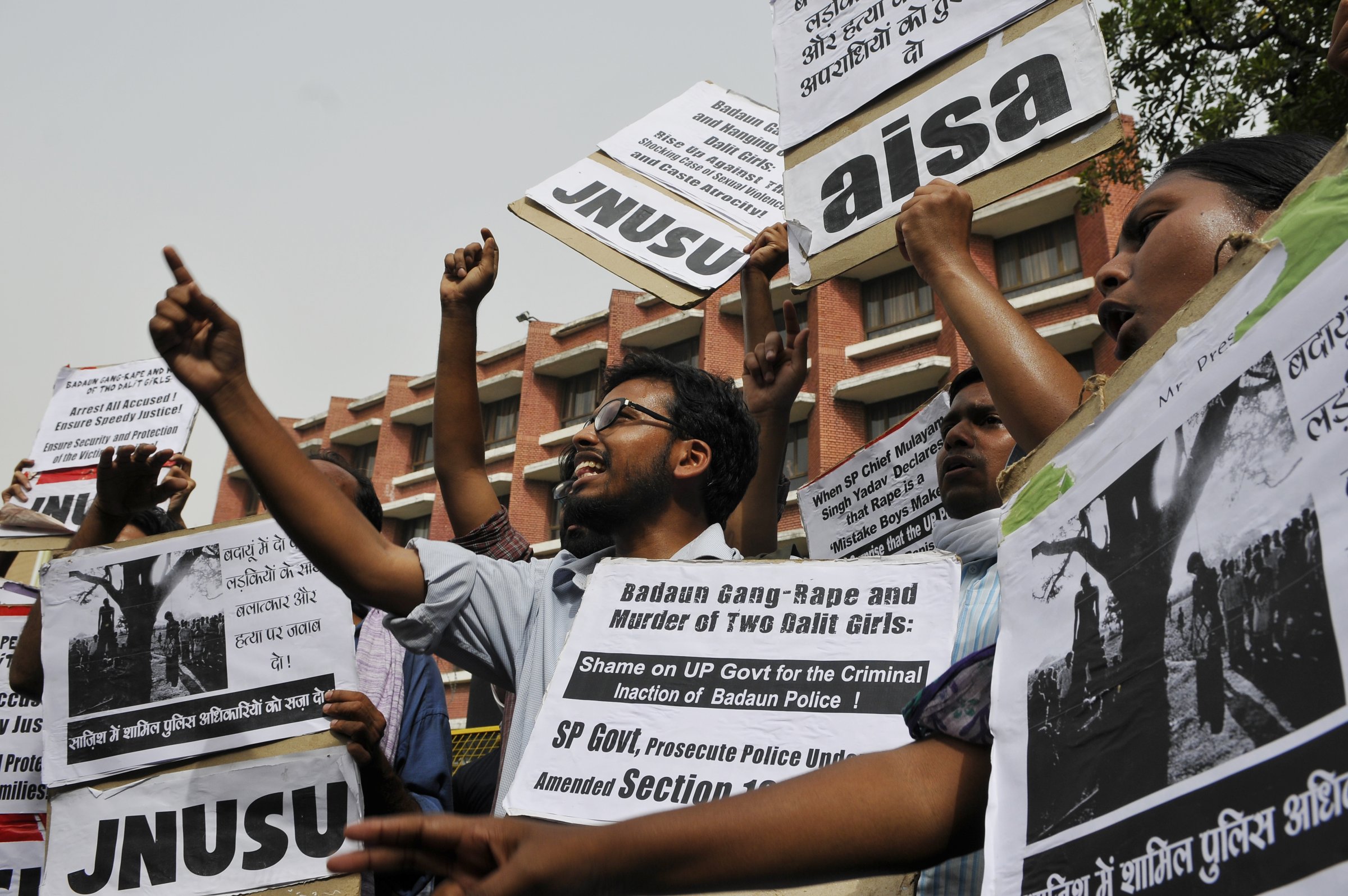
Yet again global outrage and attention are focused on India. In the most recent rape-murder in Uttar Pradesh, a story of “boys will be boys” unfolded in a chilling and familiar pattern. Two teenage girls belonging to the Dalit caste went out to the fields because there are not enough toilet facilities for women in India. They never returned.
The shocked reaction to their rape and murder was ignited in part by the devastating image of these two young girls left hanging from a tree. This image–with the local villagers holding vigil beneath them–hit me in the solar plexus despite my three decades of working to end violence against women. It’s all so hauntingly familiar–and yet the rage at the inhumanity of men and the pain at the loss of yet more female lives remain visceral. But the rage and pain are not, and should not be, focused only on the most spectacular rape-murders or misogynist massacres. (For one thing, according to India’s National Crime Records Bureau, three to five rapes of women and girls, mostly Dalit, occur daily in Uttar Pradesh alone.) We need to pay attention to–and do something about–what happens in between, and what lies beneath.
And what is that? In the context of past rapes, Mulayam Singh Yadav, head of Uttar Pradesh’s governing party, the Samajwadi Party, has said, “Boys will be boys. They make mistakes.” His statement, made in opposition to the new law calling for the death penalty for gang rapes, highlights the underlying social norms that contribute to most forms of violence against women and girls, in India and around the world.
Boys are typically rapists and murderers? Rapes and murders are “mistakes”? “Boys will be boys” is an egregious excuse and a profound insult to women and girls, and to men and boys.
It also enables the violence to continue. With global attention focused sharply on India since the “Nirbhaya” gang rape of 2012, we’ve begun to view Indian men as predators and rapists. It’s an unacceptable stereotype, but to what degree do we perpetuate it ourselves, and in the process excuse or incubate violence? Far too often, the “boys will be boys” view indulges and dismisses behavior—including daily micro-violence such as catcalling—that is totally out of bounds. Layer that with all the additional gender, class and caste privilege, and what do we have? The world’s largest–and most socially tolerated–human rights pandemic: violence and discrimination against women and girls. Not just in India. Everywhere.
What do we do? First, this is an opportunity for the Indian government to step up. India has a new prime minister with an absolute majority in the government. He and his new cabinet have the opportunity to show their commitment to women’s security and rights. Union Cabinet Minister for Women and Child Development Maneka Gandhi on Friday said that a “rape crisis cell” would be created for speedy action on such incidents.
This is a step in the right direction. But that’s about improved response after the violence has already maimed, hurt or killed. Let’s talk about prevention and how we stop the abuse. We need to ask: “Boys will be boys”–at what cost? Boys are not robotic rapists, any more than girls are ornaments and objects for their aggressions. Let’s stop saying that half the human race is inherently aggressive, predatory and incapable of transformation. As long as we presume those to be normal, immutable, uncontrollable male traits, we won’t recognize more in–or demand more from–boys and men. Indeed, this bleakly low standard harms everyone. So next time you find yourself thinking or saying “boys will be boys,” catch yourself. Our lives depend on it.
Mallika Dutt is president and CEO of Breakthrough, a global human rights organization based in India and the U.S. that works to make violence and discrimination against women and girls unacceptable.
More Must-Reads From TIME
- The 100 Most Influential People of 2024
- The Revolution of Yulia Navalnaya
- 6 Compliments That Land Every Time
- What's the Deal With the Bitcoin Halving?
- If You're Dating Right Now , You're Brave: Column
- The AI That Could Heal a Divided Internet
- Fallout Is a Brilliant Model for the Future of Video Game Adaptations
- Want Weekly Recs on What to Watch, Read, and More? Sign Up for Worth Your Time
Contact us at letters@time.com